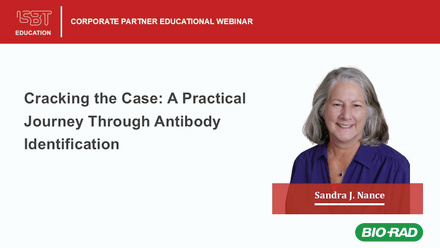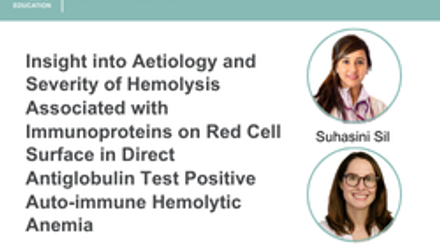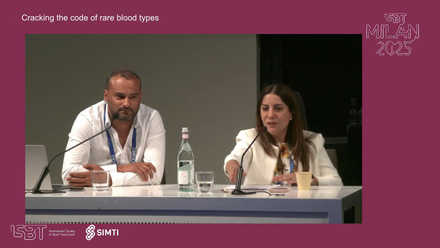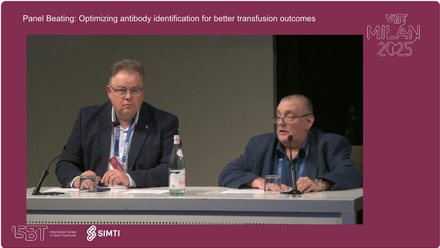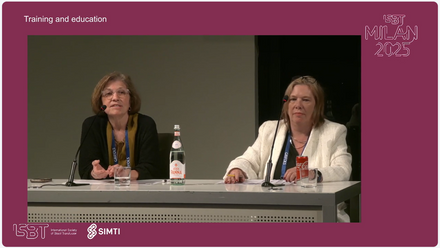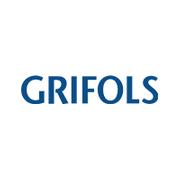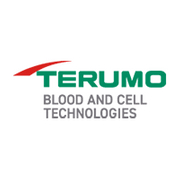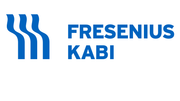The Recent technological advances in Immunohematology session included the following presentations:
1. Tim Steiert: Blood group haplotypes and third generation sequencing
2. Mercy Rophina: Characterization of the genomic landscape of blood group antigens and alleles in the Indian population utilizing whole genome sequencing data
3. Sonja Sigurdardottir: Molecular RHD donor screening in Switzerland: discovery of novel alleles by nanopore-sequencing
4. Masja De Haas: Implementation of a ddPCR method for non-invasive fetal blood group typing for alloimmunised pregnant women
MODERATORS: Christoph Gassner and Asa Hellberg
After the presentation, there was a questions and answers session of about 5 minutes, which is also included in the recording.
Abstract
Implementation of a ddPCR method for non-invasive fetal blood group typing for alloimmunised pregnant women
C Callandrini1, O Verhagen2, A Tissoudali1, B Veldhuisen3, E van Beers1, J Vessies1, M Brussee1, C van der Schoot3, M De Haas1
1Immunohematology Diagnostic Services, 2Immunocytology, Sanquin Diagnostic Services, 3Experimental Immunohematology, Sanquin and Landsteiner Laboratory, AMC, Amsterdam, Netherlands
Background: When a mother has produced blood cell antibodies, maternal to foetal blood group incompatibility can result in haemolytic disease of the foetus and newborn or foetal and neonatal alloimmune thrombocytopenia, with possible severe consequences for the foetuses’ health. To timely start treatment, foetuses need to be genotyped in the early second trimester. Traditional non-invasive foetal blood group typing is performed by RQ-PCR on cell free foetal DNA (cffDNA) extracted from maternal plasma. This technique has shown to have limitations, including background signal due to nonspecific amplification of maternal DNA and absence of a universal foetal DNA marker. Droplet digital PCR (ddPCR) is currently emerging as a valid alternative method.
Aims: To evaluate the performance of a ddPCR method for foetal blood group genotyping in alloimmunised women in clinical practice.
Methods: Between April 2022 and mid-February 2023, Sanquin Diagnostics performed a total of 235 foetal blood group genotyping tests (RHD: n = 54, KEL: n = 50, RHE: n = 72, RHC: n = 15, RHc: n = 33, HPA1-a: n = 3, HPA5-b: n = 8). Presence of foetal DNA was confirmed using the universal foetal marker methylated (m)RASSF1a.
Results: In 97 cases the foetal blood group assay result was positive, of which in 82 cases the presence of foetal DNA could also be confirmed by (m)RASSF1a ddPCR. In 123 cases the foetal blood group was negative, of which in 115 cases the inclusion of mRASSF1a enabled to issue a negative foetal blood group result. Overall, (m)RASSF1a ddPCR results indicated lower amounts of cffDNA when compared to the results obtained for the foetal target of interest. This property of our assay reduces the risk of false-negative blood typing results.
Summary/Conclusions: In conclusion, our ddPCR method is a valid diagnostic test to determine foetal blood group typing and aid clinical decision making for alloimmunised pregnant women.

